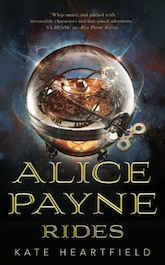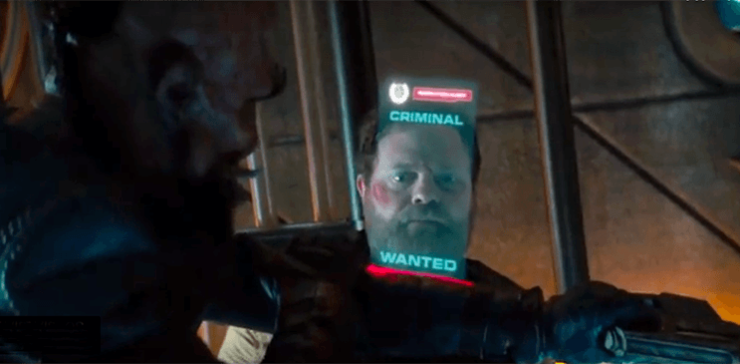Having spent the previous Short Treks spotlighting newer characters—the established Tilly in “Runaway” and Saru in “The Brightest Star,” the brand-new Craft in “Calypso“—the fourth and final one has as its spotlight a character who’s been around almost as long as Star Trek itself. Harcourt Fenton Mudd first appeared in 1966 played by the late Roger C. Carmel, and the role has been taken over in two episodes of Star Trek: Discovery by Rainn Wilson, who also directed this short.
Mudd debuted in “Mudd’s Women,” one of the first episodes Gene Roddenberry conceived during the show’s development, and also a terrible episode about “wiving” miners that has aged spectacularly badly. NBC refused to air it first, as they didn’t want to lead with an episode about a space pimp. NBC is, sometimes, smart.
He reappeared in the second season’s “I, Mudd,” making him the first and only non-Starfleet recurring character on the show, and it’s this hilarious farce of an episode that cemented Mudd as a fun character worth returning to. A third-season reappearance was planned, but scotched due to Carmel’s unavailability, but he did appear in the animated series (voiced by Carmel) in the mediocre episode “Mudd’s Passion.”
In addition, Mudd appeared in dozens of works of tie-in fiction, ranging from J.A. Lawrence’s novella “The Business, as Usual, During Altercations,” which appeared in Mudd’s Angels alongside Lawrence’s adaptations of the two Mudd episodes (the final bit of Lawrence completing the adaptation work started by her late husband James Blish), to the novel Mudd in Your Eye by Jerry Oltion, to several comic books from Gold Key and DC.
Since Discovery was taking place in the 23rd century, and since there was nothing in Mudd’s TOS appearances that precluded him encountering other starships, having him appear in the new show probably seemed like a good idea. And, as with his TOS guest shots, his second appearance was a delight after an uneven debut. “Choose Your Pain” was something of a mess (and what was good about the episode was the Discovery part of the plot, not the part Mudd was involved in), but “Magic to Make the Sanest Man Go Mad” was tremendous fun.
Buy the Book


Alice Payne Rides
“The Escape Artist” starts out equally delightful. Mudd is sold by a bounty hunter to a Tellarite named Tevrin Krit, played with excellent bluster by Harry Judge. (Judge previously appeared as another Tellarite, Admiral Gorch, in three episodes of Discovery.) Krit has a personal animus against Mudd because he slept with Krit’s sister and stole a family heirloom, a cudgel.
Mudd tries to inveigle Krit to let him go, or to team up with him, or pretty much do anything but turn him over to the Federation, who have offered a substantial reward for Mudd for a lengthy list of charges. (One of them is penetration of a space whale, a reference to “Magic to Make…” which earns him a confused and vaguely disgusted look from Krit. Mudd’s sheepish response is, “You hadda be there.”) He tries at one point to convince Krit that he’s part of a resistance against the imperialism of the Federation—which results in gales of laughter from Krit. He also eventually cops to sleeping with his sister and taking the cudgel, after initially denying it.
Throughout all this, we’re treated to flashbacks of two other occasions where Mudd has been captured—once by a diminutive bounty hunter of unknown species, once by Orions—where he’s tried all the same tactics (or, in one case, reversals of the tactics, as he pleads poverty to Krit, while he pretends to be rich to the Orions).
Eventually, Krit turns Mudd over to the U.S.S. De Milo—which ends badly for the Tellarite, as it turns out that this is an android duplicate of Mudd, one of dozens the De Milo already has in its brig. And the bounty hunter who sold “Mudd” to Krit is actually Mudd himself, who has a whole ship full of Mudd duplicates—and also Krit’s cudgel.
This twist probably sounded good when pitched, but it falls totally apart and ruins the story.
At first, I had two problems with it, but I worked my way through the first one. Mudd acted in “I, Mudd” as if the notion of duplicate androids was new to him, which is incompatible with him having an army of Mudd duplicates during Discovery’s time period a decade prior. But then I thought about the episode, and realized there was only one specific timeline reference, to the space whale. Which means it can very easily take place after “I, Mudd.” In fact, it’s the perfect sequel to “I, Mudd” in many ways. Yes, that episode ended with Mudd trapped on a world with tons of androids, but if anyone could weasel his way out of it, it’s Mudd. He already knew how to make androids based on existing templates (he made a Stella duplicate, remember), so he could do ones of himself and send them out to get “captured” easily.
The second problem, though, is that it takes the wind out of the sails of the whole plot. Part of what made the early portion of the short funny was that Mudd kept using the same tactics to get himself out of each jam he’s in. But then we find out that it’s just a preprogrammed set of verbal tics the androids use each time, and they’re not even necessarily meant to work, as it doesn’t matter what happens to the androids after Mudd-as-bounty-hunter takes the money for them, and it’s just not really funny anymore.
Ultimately, this ending has an issue that’s been endemic to far too much popular fiction of the past twenty-five years or so: the need for a surprise twist without any thought as to what that twist actually means to the narrative. And in this case, it’s a cute little “aha!” moment, but the more you think about it, the less it makes sense. (Also, why do the Mudd androids all say the same thing over and over again when in each others’ presence?)
I do like the different outfits the various Mudd androids are wearing, including the two outfits from “Mudd’s Women” and “I, Mudd,” a nice touch. And Jonathan Watton as the De Milo officer beautifully plays the restrained frustration of getting yet another Mudd on board. The music is also excellent, the soundtrack occasionally giving us a more 70s caper movie feel, which works perfectly.
This is a good vehicle for Wilson, at least, and it’s a diverting little short, but it screws up the landing completely.
Keith R.A. DeCandido has written an extensive amount of Star Trek fiction, precisely none of which features Mudd. He’s looking forward to reviewing Discovery‘s second season for this site starting in two weeks.










